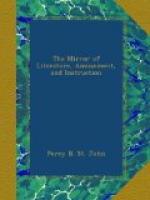* * * * *
OLD JESTS.
Persons who gloat over dust and black-letter need scarcely be told that the best of “modern” jests are almost literally from the antique: in short, that what we employ to “set the table on a roar” were employed by the wise men of old to enliven their cups, deep and strong;—that to jest was a part of the Platonic philosophy, and that the excellent fancies, the flashes of merriment, of our forefathers, are nightly, nay hourly, re-echoed for our amusement. Yet such is the whole art of pleasing: what has pleased will, with certain modifications, continue to please again and again, until the end of time.
But we may displease; and, as Hamlet says, “We must speak by the card.” The Athenaeum a fortnight since drew forth a batch of these jests with antique humour richly dight, and here they are. The reader will recognise many old acquaintances, but he need not touch his hat, lest, his politeness weary him. These old stories are but “pick’d to be new vann’d.”
Hierocles’ Facetiae.
1. An irritable man went to visit a sick friend, and asked him concerning his health. The patient was so ill that he could not reply; whereupon the other in a rage said, “I hope that I may soon fall sick, and then I will not answer you when you visit me.”
2. A speculative gentleman, wishing to teach his horse to do without food, starved him to death. “I had a great loss,” said he; “for, just as he learned to live without eating, he died.”
3. A curious inquirer, desirous to know how he looked when asleep, sat with closed eyes before a mirror.
4. A young man told his friend that he dreamed that he had struck his foot against a sharp nail. “Why then do you sleep without your shoes?” was the reply.
5. A robustious countryman, meeting a physician, ran to hide behind a wall; being asked the cause, he replied, “It is so long since I have been sick, that I am ashamed to look a physician in the face.”
6. A gentleman had a cask of Aminean wine, from which his servant stole a large quantity. When the master perceived the deficiency, he diligently inspected the top of the cask but could find no traces of an opening. “Look if there be not a hole in the bottom,” said a bystander. “Blockhead,” he replied, “do you not see that the deficiency is at the top, and not at the bottom?”
7. A young man meeting an acquaintance, said, “I heard that you were dead.” —“But,” says the other, “you see me alive.”—“I do not know how that may be,” replied he: “you are a notorious liar, but my informant was a person of credit.”
8. A man, hearing that a raven would live two hundred years, bought one to try.
9. During a storm, the passengers on board a vessel that appeared in danger seized different implements to aid them in swimming, and one of the number selected for this purpose the anchor.




